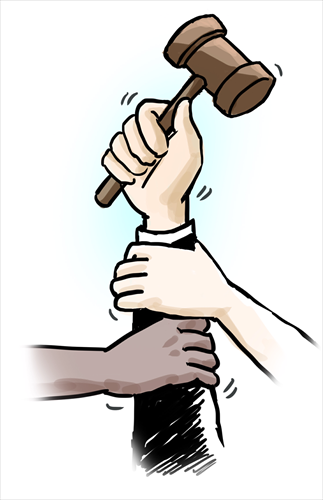HOME >> OP-ED
Activists should understand police feelings
By Rong Xiaoqing Source:Global Times Published: 2014-12-25 21:23:01

Illustration: Liu Rui/GT
When he was campaigning for the office last year, New York Mayor Bill de Blasio vowed to mend the uneasy relationship between the police and black and Hispanic people. The strategy played a big role in his victory given the deep tensions built up over 20 years of tough policing tactics that had helped to reduce the city's crime rate a lot but had also created massive tensions with those communities.
But less than a year after taking office, de Blasio's criticism of the police has come back to haunt him.
There have been waves of protest marches and rallies in the city following the shooting to death of a black teenager Michael Brown in Ferguson, Missouri, by a white police officer, and the chokehold death of illegal cigarette vendor Eric Garner in Staten Island, New York City, also at the hands of a white cop. Decisions by two grand juries not to indict the officers for the deaths inflamed the black community and supporters in the wider population. And the apparently accidental shooting death of another black man in Brooklyn, New York by a rookie cop only intensified the tensions.
De Blasio angered New York's police unions with a series of what they perceived to be anti-police positions, most importantly his declaration that he had trained his teenage son to be extra careful around cops because of his color.
And then this tinderbox was ignited when an apparently deranged black gunman murdered two cops execution-style as they sat on their patrol car on a Brooklyn street in the middle of a quiet Saturday afternoon. Before the killings, after having murdered his girlfriend, the gunman had declared on social media he was going to kill two cops to avenge the deaths of Brown and Garner.
The mayor was accused of having blood on his hand by the head of the most powerful police union for encouraging anti-police sentiment. The union had already been organizing a campaign to get police officers to sign a note saying they didn't want de Blasio to attend their funerals if they were killed in the line of duty. The huge gulf between the police and the mayor in the Big Apple has gained New York embarrassing headlines worldwide.
How did a reformer like de Blasio, with good intentions to improve relations between the police and the black and Hispanic communities, land in such a mess?
To be fair, de Blasio had been merely trying to fulfill a campaign promise since he took office in January. And his reform of the controversial "stop and frisk" program had been going smoothly before the recent incidents. The police have reduced use of the controversial tactic especially in the minority communities. And that hasn't led to an increase in the crime rate as many people feared. Instead, the overall crime rate has dropped almost 5 percent last year and the murder rate, already at a multi-year low, has dropped another 5 percent.
But good luck turning bad was not the main reason for de Blasio's predicament. An old liberal mind-set on racial issues arguably trapped him.
From the beginning, de Blasio seemed to have set his vision on mending the gap between the police and the minority communities by only fixing police behavior. In the "stop and frisk" controversy, it is the police who took all the blame. And the comments about his son only highlighted one aspect of the fears felt when young black men met police officers. Let's face it, the police are often frightened too.
If he had balanced such stances and comments with criticism of black communities for not acting to stop some young black men from committing violent crimes, often with guns, then he would have been less vulnerable. He didn't. The two officers who were executed were both ordinary Brooklyn folk, one was Hispanic, the other Chinese, loved by their families and respected by their communities.
Officers like those put themselves in danger to reduce crime in black areas of New York, areas in which the victims of black crime are usually other black people.
Taking a side and fighting for it relentlessly is a tactic that worked well in the early stages of the civil rights movement. And it deserves credit for the achievements of that movement. But today's racial issues are often more nuanced than those of yesteryear.
Direct and visible discrimination has largely subsided, though less visible discrimination remains. The conflicts are not only defined between black and white, but often among people from different minority groups. And many times, conflicts are not caused by just the wrongdoing of one party. Liberal and left-wing politicians like de Blasio and veteran black political leader Al Sharpton don't see that. Michael Brown was killed after he had stolen cigars and roughed up an Asian shopkeeper - not a crime anyone should die for but also not behavior that showed him in a positive light.
Now it is de Blasio's responsibility to clean up the mess. That means he has to become more balanced. But it is the responsibility of everyone who would like to see the civil rights movement continuing to make progress for society as a whole to help it update its tactics for the 21st century.
The author is a New York-based journalist. rong_xiaoqing@hotmail.com
Posted in: Viewpoint, Rong Xiaoqing